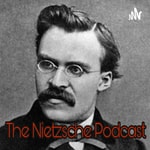The Nietzsche Podcast – Details, episodes & analysis
Podcast details
Technical and general information from the podcast's RSS feed.

The Nietzsche Podcast
Untimely Reflections
Frequency: 1 episode/7d. Total Eps: 223

Recent rankings
Latest chart positions across Apple Podcasts and Spotify rankings.
Apple Podcasts
🇨🇦 Canada - philosophy
02/08/2025#50🇬🇧 Great Britain - philosophy
02/08/2025#31🇩🇪 Germany - philosophy
02/08/2025#80🇺🇸 USA - philosophy
02/08/2025#45🇨🇦 Canada - philosophy
01/08/2025#31🇬🇧 Great Britain - philosophy
01/08/2025#25🇺🇸 USA - philosophy
01/08/2025#38🇨🇦 Canada - philosophy
31/07/2025#34🇬🇧 Great Britain - philosophy
31/07/2025#67🇺🇸 USA - philosophy
31/07/2025#35
Spotify
No recent rankings available
Shared links between episodes and podcasts
Links found in episode descriptions and other podcasts that share them.
See all- https://www.instagram.com/p
11467 shares
RSS feed quality and score
Technical evaluation of the podcast's RSS feed quality and structure.
See allScore global : 58%
Publication history
Monthly episode publishing history over the past years.
99: Carl Jung - The Undiscovered Self
Season 5 · Episode 3
mardi 3 septembre 2024 • Duration 01:45:58
In 1956, Jung wrote the essay entitled, "Past and Future" in German, but we know it in English as "The Undiscovered Self". Having witnessed the horror of the world wars, and the ongoing apocalyptic danger of the Cold War, Jung attempted to explain why it was that societies sometimes went mad. This is how Europe experienced the outbreak of The Great War: as mass insanity. Why would free people gravitate towards cult-like tyrannies? How could ordinarily moral and reasonable people perpetrate acts of unthinkable violence? And how could our constitutional democracies remain susceptible to these outbursts, if we are so committed to principles such as freedom and human dignity? For Jung, the only answer is self-knowledge, but that is the one thing that modern society is making impossible
98: Yukio Mishima - Sun & Steel
Season 5 · Episode 2
mardi 27 août 2024 • Duration 01:24:18
Yukio Mishima (born Kimitake Hiraoka, 1925-1970) wrote dozens of stories, including famous works such as Confessions of a Mask, and Patriotism. He was considered for a Nobel Prize in literature about half a dozen times, through he never won it. His works were adapted into films, which received international acclaim. He wrote modern No plays which were performed all over the world, in Europe and America. He is known for his provocative style, his romanticization of death and of warrior culture, and for his political radicalism. Mishima desired to return Japan to a pre-WWII samurai culture, ruled under the absolute authority of a divine emperor – and yet, his writing incorporates influences not only from traditional Japanese literature, but from writers from the west: Rilke, Wilde, Batailles, Klossowski, and, of course, Friedrich Nietzsche. From the time he was 19, when he first picked up a copy of Birth of Tragedy, Mishima had a lifelong fascination with Nietzsche. In this episode, we consider the major philosophical ideas in his combination of confession and criticism, Sun and Steel: the unity of art and action, the corrosive nature of words, and necessity of a 'beautiful death' to truly affirm one's existence.
96: Nietzsche as Educator
Season 4 · Episode 34
mardi 11 juin 2024 • Duration 01:06:54
A summary of Nietzsche's teachings, examined by considering the parallel of Schopenhauer's influence on Nietzsche with how the modern person could adopt Nietzsche as a similar type of influence. I attempt to distill the central message of Nietzsche's philosophy, and explain how this interpretative framework helps elucidate new angles to many of his important ideas. This episode is my final word on Nietzsche's philosophy, considered in its totality, as the podcast transitions away from our focus on the primary sources in Nietzsche and into interpretations of Nietzsche and Nietzsche-adjacent material. A love letter to the fans and a last hurrah into exegesizing Nietzsche, incorporating topics from throughout the season and with callbacks to the earliest episodes. Celebrating three years of The Nietzsche Podcast as of this month!
Episode art: Maxfield Parish - Jason and His Teacher, Chiron the Centaur
49: The Sipo Matador
Season 3 · Episode 1
mardi 18 octobre 2022 • Duration 01:40:30
Q&A #5
Season 2 · Episode 42
mardi 11 octobre 2022 • Duration 02:00:37
Birth of Tragedy #8: 22-25 (Conclusion)
Season 2 · Episode 41
mardi 4 octobre 2022 • Duration 02:04:14
Nietzsche recapitulates and summarizes his positions, and provides us with a few relatively simple formulas for understanding the interaction of the two art-forces. He hopes for a rebirth of tragic art in Europe. We conclude with my distillation of the main philosophical concepts, the significance of which can be expanded beyond the work.
Birth of Tragedy #7: 18-21 (Alexandrianism)
Season 2 · Episode 40
mardi 27 septembre 2022 • Duration 01:59:02
Birth of Tragedy #6: 14-17 (The Theoretic v/s the Tragic)
Season 2 · Episode 39
mardi 20 septembre 2022 • Duration 02:36:28
Socrates, having been introduced in the last chapter we studied in the previous section, appears now to threaten all art, with a worldview described as "the theoretic", which is fundamentally opposed to the tragic. The theoretical worldview is, by nature, optimistic, moralistic, and against all illusion and ignorance. Nietzsche first raises the prospect of "an artistic Socrates", and rails against the New Attic Comedy as a degenerated artform in comparison to Attic Tragedy.
Birth of Tragedy #5: 11-13 (Euripedes & The Death of Tragedy)
Season 2 · Episode 38
mardi 13 septembre 2022 • Duration 02:00:02
Birth of Tragedy #4: 8-10 (Evolution of the Satyr Chorus & Suffering Hero)
Season 2 · Episode 37
mardi 6 septembre 2022 • Duration 02:12:30









